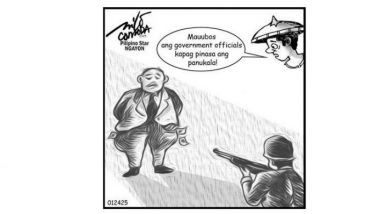US 'the ultimate guarantor of peace' in Philippines-China dispute
SEOUL, Korea - Security in East Asia remains "brittle," highlighting the need for continued dialogue among countries in the region and the participation of the United States (US), speakers at an annual policy forum said on Monday.
"The reality is, (the situation) is brittle. There is a possibility of accidents," said Richard Haas, president of the Council on Foreign Relations, at the 7th World Policy Conference.
Jean-David Levitte, a distinguished fellow at the Washington-based Brookings Institution, agreed, noting that China's interest in the region is "less about fish, oil and gas, it's more about sovereignty."
It wants to be "recognized" and "accepted" as a major player in the region, he pointed out, something its neighbors, particularly the ASEAN and Japan, feel uncomfortable of.
"That is why there is one actor that we need and this is the US. The US has to play the role as the balancing power. The US should serve as the ultimate guarantor of peace," Levitte explained during the plenary session.
The Philippines, together with its colleagues in the Association of Southeast Asian Nations (ASEAN), is embroiled in territorial disputes with China in the islands in South China Sea.
The country, in particular, has lodged a complaint against China before the UN-led Permanent Court of Arbitration at The Hague.
For Haas, the persistent conflict among East Asian economies could be traced in the "complicated geography" of the region, but more so in the sense of nationalism that has played an important role in foreign relations.
Instead of answering the Philippines's complaint by the December 15 deadline, China published a position paper where it said it will "neither accept nor participate" in the arbitration, emphasizing instead its historical claim to the contested islands.
For his part, Han Sung-Joo, former Korean foreign minister, said that while the US pivot to Asia "gave security" to its allies, America should refrain from making countries choose between the two superpowers.
"The US seems to regard joining TPP as pro-US and those that join China's (efforts) as pro-China," he said, pertaining to the American-led trade pact, Trans-Pacific Partnership.
"This shouldn't be the case. China wants to find ways to cooperate with the US," he added.
Meanwhile, Russia, which is also at loggerheads with the US over the crisis in Ukraine, also expressed optimism that an East Asian security pact will soon be established and has extended an offer to help broker the agreement.
At this early though, Deputy Foreign Minister Igor Morgulov tried to allay fears of any illicit intentions, by saying Russia's interest in the region is "open and transparent."
"I just want to underscore that Russia does not have any hidden agenda... We remain hopeful for an improvement in interstate relations and this should be done on the basis of dialogue and participation of a maximum number of states," Morgulov explained.
- Latest
- Trending






























